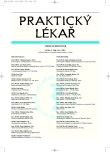Colorectal cancer and inflammatory bowel diseases.
Kolorektální karcinom a nespecifické střevní záněty
Nemocní s nespecifickými střevními záněty mají větší riziko vzniku kolorektálního karcinomu než běžná populace. Nejdůležitějšími faktory, které vedou ke vzniku neoplázie, jsou doba trvání nemoci, rozsah postižení, přítomnost primární sklerozující cholangoitidy a vznik onemocnění v mladém věku. Naproti tomu pravidelné kolonoskopické sledování, dobrá spolupráce s nemocným, užívání mesalazinu či Mátová suplementace vedou ke snížení tohoto rizika. Důležité je vyhledávání preneoplastických lézí ve střevě, jako jsou hlavně dysplastické změny a jejich správné hodnocení. Je vhodné zvolit rozumný dispenzární program k včasnému záchytu prekancerózních afekcí či tumoru již v ranném stadiu, aby se mortalita na toto závažné onemocnění snížil
Klíčová slova:
nespecifické střevní záněty, dysplázie, kolorektální karcinom, kolonoskopie.
Authors:
Z. Beneš
Authors‘ workplace:
Přednosta: MUDr. Zdeněk Beneš, CSc.
; Fakultní Thomayerova nemocnice, Praha II. interní klinika
Published in:
Prakt. Lék. 2007; 87(10): 624-626
Category:
Of different specialties
Overview
Patients with inflammatory bowel diseases have an increased risk of developing cancer. Duration of disease, extent of inflammation, presence of primary sclerosing cholangoitis and onset of disease in childhood are among the most important factors contributing to tumour genesis. However, this risk can be lowered with periodical colonoscopy, good patient/physician collaboration, and mesalazine or folic acid treatment. It is very important to look out for preneoplastic changes (mainly dysplasia) and to properly evaluate them. It is advisable to establish a reasonable preventive program for the early detection of preneoplastic changes or tumours in order to decrease the mortality from this serious disease.
Key words:
inflammatory bowel diseases, dysplasia, colorectal cancer, colonoscopy.
Labels
General practitioner for children and adolescents General practitioner for adultsArticle was published in
General Practitioner

2007 Issue 10
- Advances in the Treatment of Myasthenia Gravis on the Horizon
- Hope Awakens with Early Diagnosis of Parkinson's Disease Based on Skin Odor
- Memantine in Dementia Therapy – Current Findings and Possible Future Applications
- Memantine Eases Daily Life for Patients and Caregivers
- Possibilities of Using Metamizole in the Treatment of Acute Primary Headaches
-
All articles in this issue
- Diabetes, pre-diabetes and cardiovascular diseases
- Pneumothorax. Overview and current therapeutic options.
- Hemochromatosis – a current review
- Prion diseases in humans
- Urological complications of gynaecologic surgery
- Tumour of the hands
- Regulation of bone cell metabolism at the cellular and molecular level
- Posttraumatic stress disorder (PTSD)
- Initial experience using a laser-balloon endoscopic catheter for the treatment of patients with paroxysmal atrial fibrillation
- Colorectal cancer and inflammatory bowel diseases.
- Progressive heart failure due to cardiac amyloidosis
- General Practitioner
- Journal archive
- Current issue
- About the journal
Most read in this issue
- Urological complications of gynaecologic surgery
- Pneumothorax. Overview and current therapeutic options.
- Posttraumatic stress disorder (PTSD)
- Hemochromatosis – a current review
